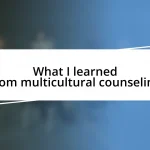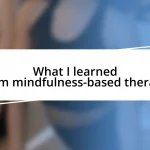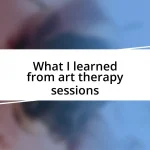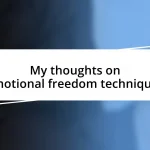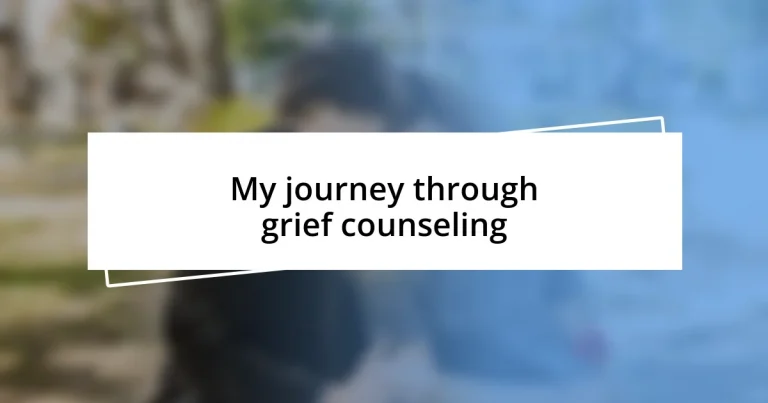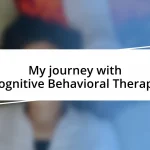Key takeaways:
- Grief is a non-linear, personal journey that involves fluctuating emotions; acceptance of this process is crucial for healing.
- Seeking professional help, whether through therapy, support groups, or workshops, can significantly reduce the emotional burden of grief and provide valuable coping strategies.
- Building a support system and engaging in reflective practices, like journaling or sharing stories, are essential for moving forward while honoring the memories of loved ones.
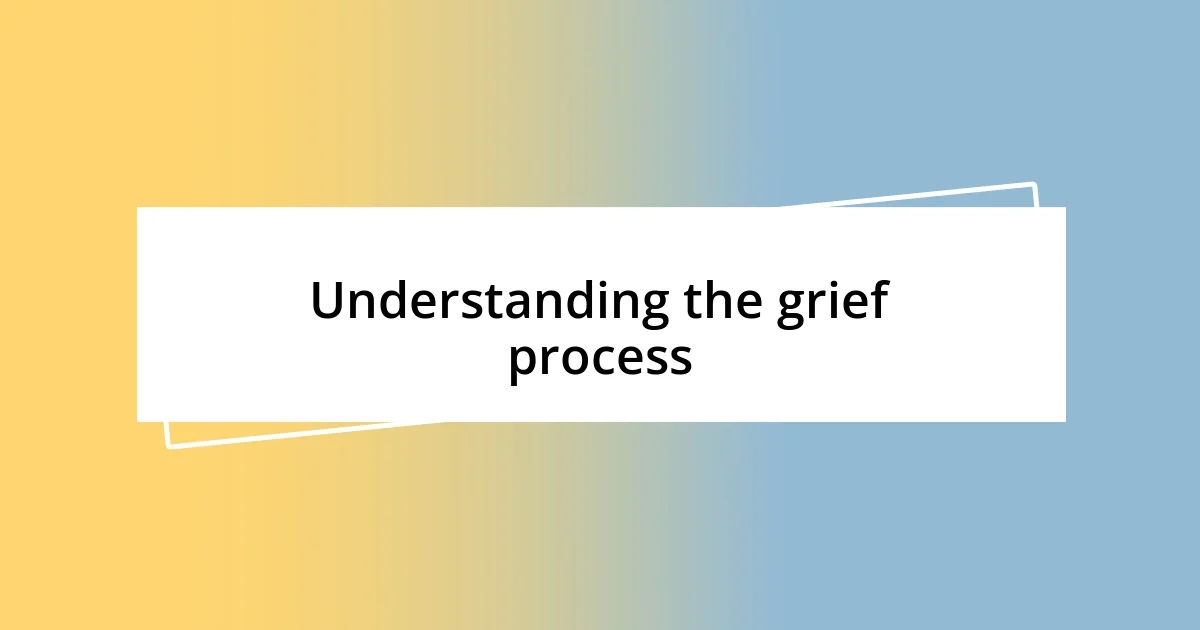
Understanding the grief process
Grief is a deeply personal and often unpredictable journey. I remember feeling ambushed by waves of sadness at the strangest times—a song on the radio or a familiar scent could bring back memories I’d thought I was managing to set aside. Have you ever found yourself caught in a moment like that, where the weight of loss comes crashing in without warning?
As I navigated my own grief, I learned that there isn’t a one-size-fits-all timeline. Some days, I felt a sense of anger, while others brought profound acceptance. What surprised me most was the idea that embracing these varying emotions was a crucial part of healing. It made me wonder, is grief less about reaching an end point and more about learning to live with the memories?
There are stages of grief, like denial, anger, bargaining, depression, and acceptance, but they aren’t linear. I found myself looping through them, often revisiting feelings I’d thought I’d already processed. This non-linear journey taught me that it’s okay to feel stuck sometimes—after all, who wouldn’t struggle after losing someone they loved? In those moments, I had to remind myself that each of these emotions brought me one step closer to understanding my loss.

Seeking professional help
Seeking professional help can feel like a daunting step, especially when wrestling with the many facets of grief. I still recall my hesitance to reach out. I thought, “Can anyone really understand what I’m going through?” But, as I discovered, professionals are trained not just to listen, but to guide individuals through their unique grief journey with empathy and understanding. It was a revelation to me that asking for help could actually lighten the emotional burden I carried.
Initially, I underestimated the power of therapy. The first time I sat in a counselor’s office, I shared my story hesitantly, expecting to be judged. Instead, I was met with an openness that allowed me to unload years of unprocessed feelings. It became clear how valuable it was to have someone validate my experiences and help me unpack each emotion, one session at a time. This support made me realize I wasn’t alone in this complex process.
Throughout my journey, I also learned about different types of grief counseling available. It’s not just about traditional therapy—there are support groups, one-on-one sessions, and even workshops designed for those grieving. Choosing the right approach can greatly affect your healing process. In my case, I found that a mix of group discussions and personal sessions helped me navigate my feelings more effectively than going it alone.
| Type of Counseling | Benefits |
|---|---|
| Individual Therapy | Personalized support and tailored coping strategies |
| Support Groups | Shared experiences and validation from others facing similar losses |
| Workshops | Interactive learning and new coping techniques in a supportive environment |
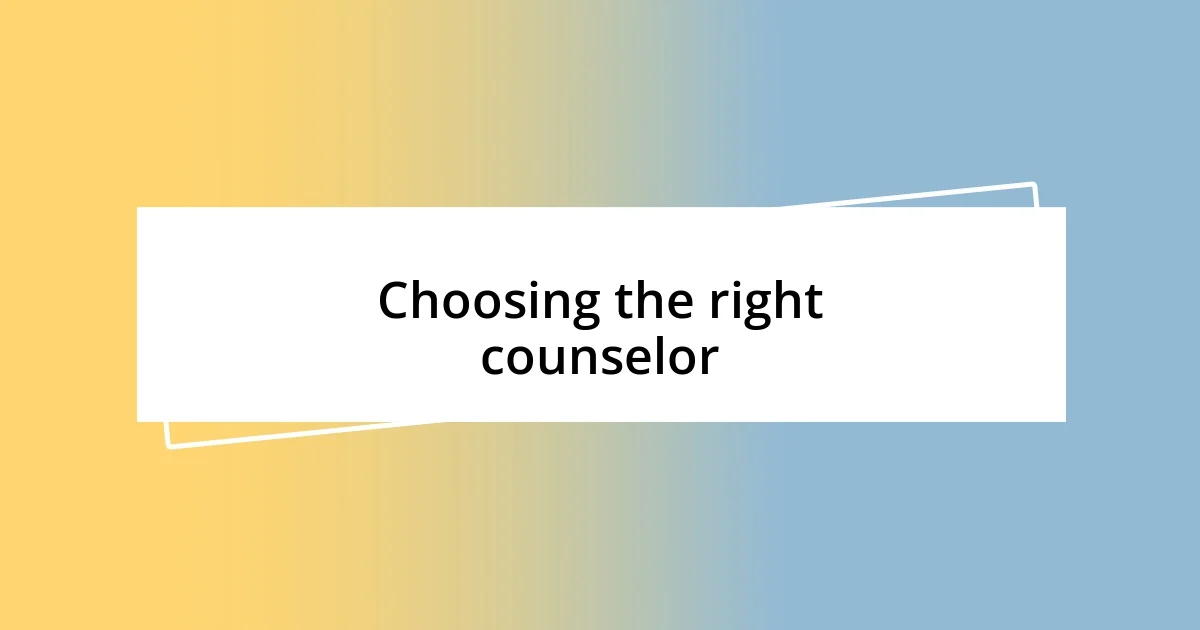
Choosing the right counselor
Choosing the right counselor is an essential step in your grief journey. As I navigated the myriad of options available, I quickly learned how important it was to find someone who resonated with me. Initially, I felt overwhelmed by the sheer number of counselors listed online. However, I began to pay attention to their specializations and approaches, which guided my decision. Ultimately, it was a gut feeling that led me to connect with a counselor who truly understood the essence of grief.
Here are a few important factors to consider when choosing a counselor:
– Experience: Look for someone who specializes in grief counseling and has a track record of helping others through similar losses.
– Approach: Consider whether you prefer a more structured therapy style or an open, conversational approach.
– Comfort: It’s crucial to feel at ease with your counselor—trust your instincts after an initial session.
– Availability: Ensure their schedule aligns with yours, so you can build a consistent routine.
– Referrals: Don’t hesitate to ask friends or family for recommendations; personal experiences can provide valuable insight.
Finding the right fit can dramatically enhance your healing experience. For me, it was about that instant connection during our first conversation—her empathy felt like a warm embrace, making me realize I was in the right place. That initial comfort opened the door to deeper discussions, allowing me to explore my emotions freely and without judgment.
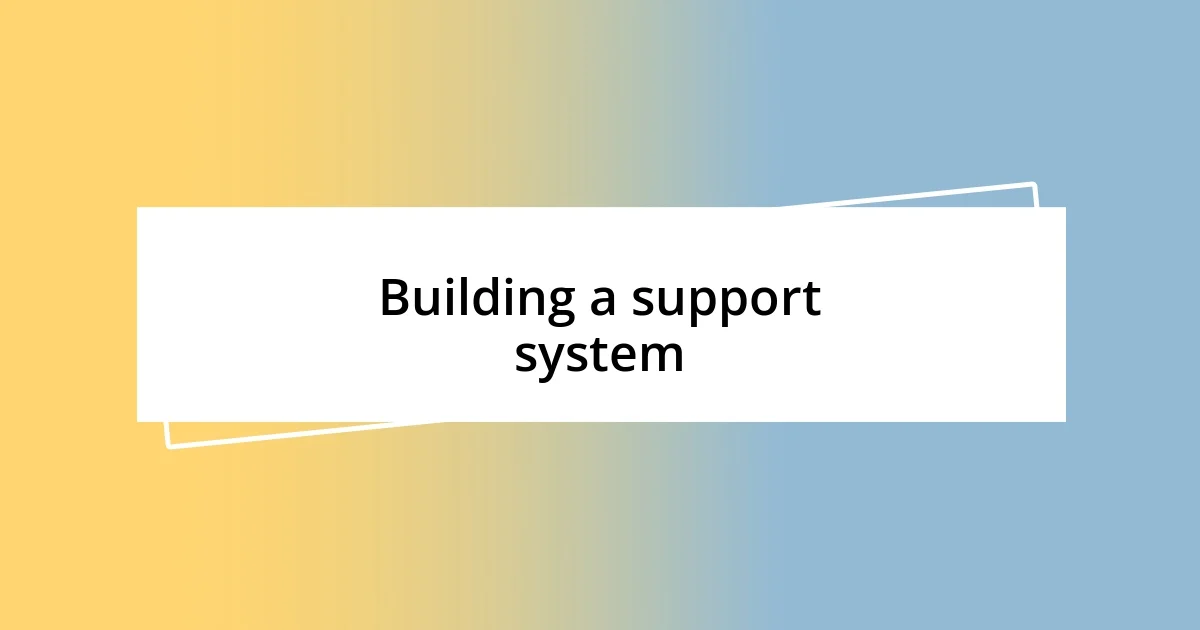
Building a support system
Building a support system is vital during the grieving process. I found myself reaching out to friends and family, hoping they would simply listen. At first, I hesitated; I wondered, “Would they understand? Would I be a burden?” Surprisingly, when I finally opened up, I discovered just how comforting it was to lean on those who genuinely cared.
As I navigated my grief, I realized that my support system wasn’t limited to just close friends. I began attending community groups focused on loss. I still remember the warm energy in the room, where every shared story felt like a thread weaving us closer together. Being surrounded by individuals who had endured similar losses made me feel validated; it was like finding kindred spirits who understood a language of sorrow I couldn’t quite articulate.
Creating this support network was an ongoing journey, and I learned to be intentional about who I let in. While some people offered compassion, others inadvertently said things that felt hurtful or dismissive. I learned that it was okay to set boundaries—after all, my healing was the priority. How has your experience been with building your own support system? I can tell you, surrounding myself with understanding souls has transformed my approach to grief.
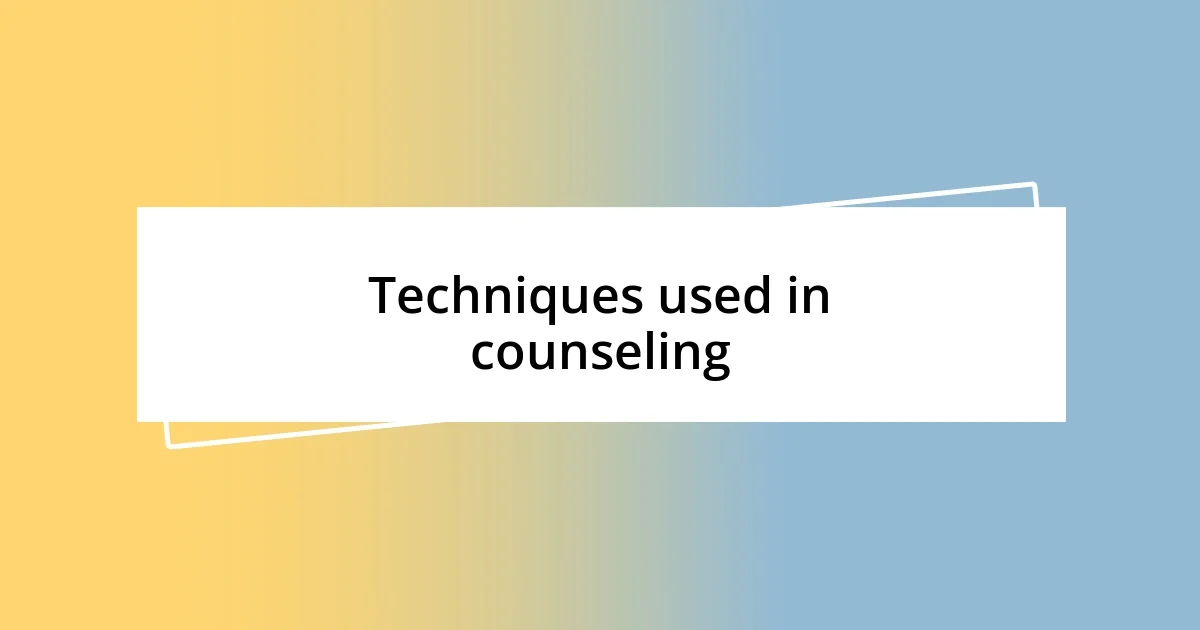
Techniques used in counseling
When I first stepped into grief counseling, I was introduced to various techniques that felt almost therapeutic in their own right. One approach that really resonated with me was cognitive-behavioral therapy (CBT). It helped me reframe my negative thoughts about grief, turning them into reflections that felt more manageable. Have you ever found yourself spiraling into overwhelming emotions? I certainly did, but this technique gave me tools to challenge that spiral, which was empowering.
Another powerful technique was the use of narrative therapy. In sessions, I would share my story, a process that allowed me to externalize my grief, making it feel less like an insurmountable weight. Every time I recounted my experiences, I felt a little lighter. I remember one particular session where I delved deep into the memories of my loved one, and it was as if I was breathing them back to life through my words. It left me with a bittersweet feeling, but also a sense of connection that was incredibly healing.
Mindfulness practices also played a significant role in my journey. These exercises encouraged me to stay present amid the chaos of emotions. I vividly recall one meditation where I focused on simply feeling my breath, allowing myself to acknowledge my sorrow without judgment. It was as if a calm wave washed over me, chasing away the storm, even if just for a moment. Have you ever tried mindfulness? It took me a while, but embracing it opened a door to self-compassion I didn’t know I needed.
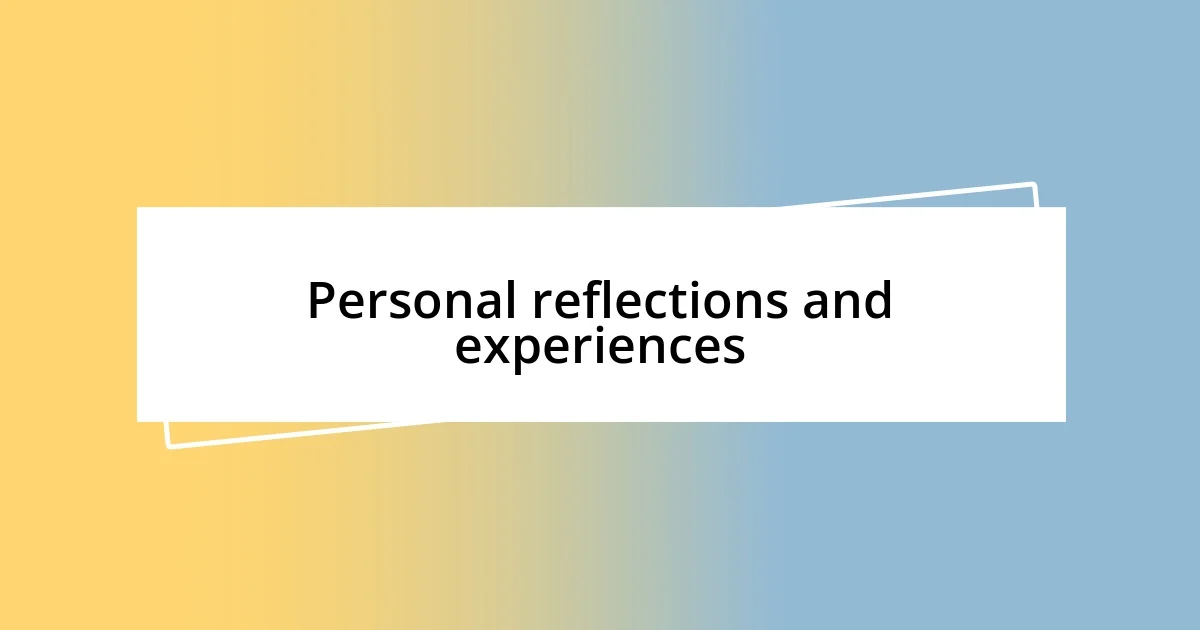
Personal reflections and experiences
Reflecting on my experiences in grief counseling, one vivid memory stands out: a moment when I realized that tears were not a sign of weakness, but rather a testament to my love and loss. I remember sitting in my counselor’s office, feeling a wave of emotion wash over me as I spoke about my loved one. “Why do I feel so guilty for crying?” I had asked, and my counselor gently reminded me that expressing grief is a vital part of healing. This simple truth transformed my perspective, encouraging me to embrace those tears instead of shying away from them.
Throughout my journey, I discovered that sharing memories was a vital act of honoring those I had lost. One particularly poignant session involved writing a letter to my loved one, a cathartic exercise that brought emotions to the surface. As I penned my thoughts, I could almost hear their voice urging me to keep going, offering solace in their absence. Has writing ever helped you process feelings? For me, it became a bridge to connect with the past while moving forward, illustrating how grief doesn’t have to be a solitary experience.
There were moments, too, when I grappled with anger as part of my grief. I vividly recall discussing frustrations with friends who seemed uncomfortable with my sorrow. “Why aren’t they reaching out more?” I pondered. It highlighted an important lesson: not everyone knows how to respond to grief, and that’s okay. Acknowledging this complexity allowed me to foster more open conversations, leading to deeper connections with those who truly wanted to support me. Have you noticed similar dynamics in your interactions? These reflections taught me that grief is a shared journey, not just a personal path.
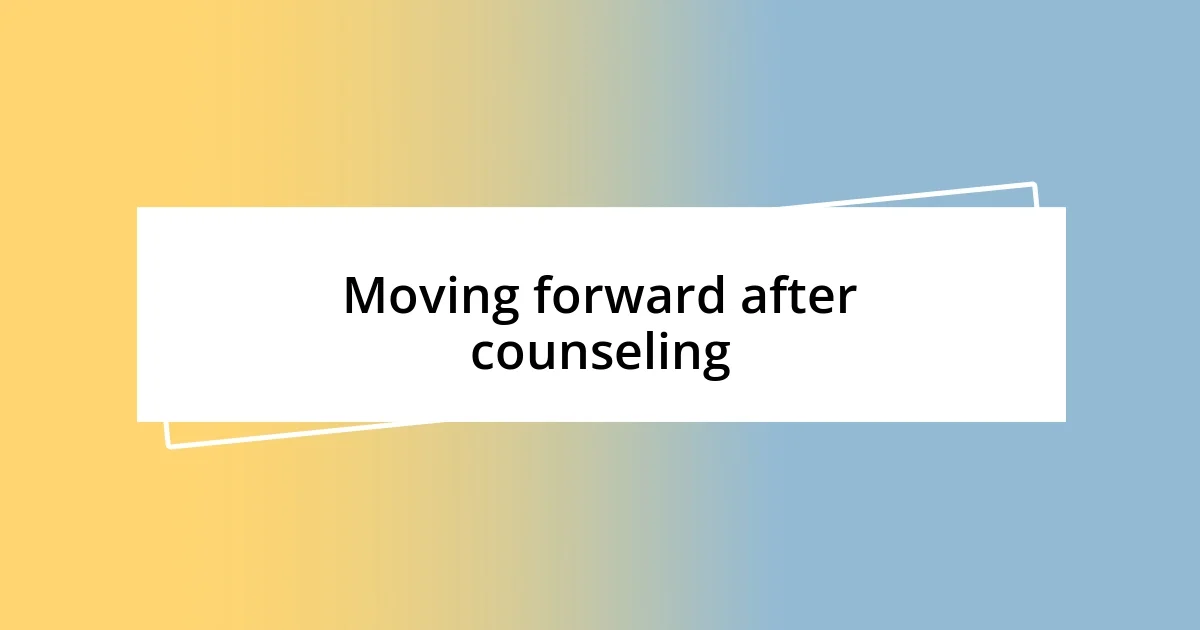
Moving forward after counseling
Moving forward after counseling can feel like a delicate balancing act. I remember stepping out of my last session, feeling a mix of relief and uncertainty. It hit me: while I was equipped with tools for coping, the real test lay in applying them to my everyday life. Have you ever faced a moment like that, where the lessons learned feel heavy with expectation? For me, it was a journey of integrating those insights into my daily routine.
One powerful shift came when I started creating a gratitude journal. I hadn’t initially thought about recognizing the small joys amidst my sorrow, but acknowledging one positive thing each day became a transformative practice. I recall a morning where I jotted down how the sun’s warmth felt on my skin, a simple yet profound reminder that life continues even through grief. In what ways do you cultivate gratitude in your own life? It’s interesting how small practices can redefine our perspective and help us move forward.
I also found comfort in connecting with others who shared similar experiences. Joining a support group was a game-changer; it created a safe space to express my feelings without judgment. I vividly remember a session where someone else voiced the confusion I felt about the future. “How do you envision happiness again?” they asked. Hearing their vulnerability inspired me to share my fears, and in that moment of connection, I realized that moving forward doesn’t mean forgetting. It means welcoming new joys while still cherishing the memories of our loved ones. Have you sought out connections like that? It’s amazing how shared experiences can lighten the burden of grief.



